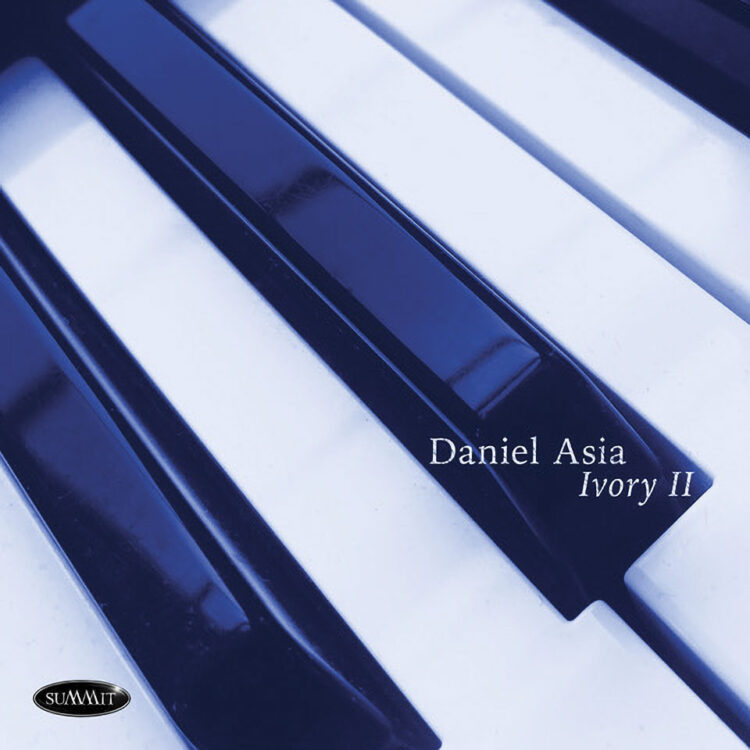ASIA Piano Sets I1 & II2. Piano Variations3. No Time4. Ragflections5. Iris6 · 1-5Daniel Linder, 2Fanya Lin, 6Dana Muller, 6Gary Steigerwalt (pn) · SUMMIT 769 (76:38)
Two of Daniel Asia’s discs have really impressed previously: his String Quartets Nos.
1-3, works that, as I put it in Fanfare 43:1, “demand to be heard,” and To Open in Praise, a
disc of vocal music, which I reviewed in Fanfare 41:3 alongside an interview with the
composer. Both discs were, like this one, on the Summit label, but now it is the turn of the
piano music. The present disc is entitled Ivory II and follows on, logically enough, from
Ivory; in doing so it completes all of Asia’s piano music thus far. Volume One of the piano
music (entitled Ivory) contained the Scherzo Sonata, the Piano Quartet and Why (?) Jacob.
It always helps to have a performer who is ultra-attuned to one’s music, and Asia
certainly seems to have that in Daniel Linder. Take the fast patterns of the first piece of Piano
Set I, (19750 marked “Tensely energetic,” which here has that sort of nervous propulsion one
associates with Ligeti Etudes (the composer calls it “proto-minimalist”); the fourth movement
seems a close cousin, although there contrasted by a prayer-like chordal passage. The serenity
of the second movement (“Dreamlike, with much rubato”) itself rubs against the disjunct
gestures of the fragmented third (“Exuberante!”); Asia calls this the musical equivalent of a
Jackson Pollock painting. It is not just the virtuosity that is impressive here, it is Linder’s
ability to be a pianistic chameleon, fearlessly tackling the challenges head-on while finding
beauty in the most austere moments.
The follow-on piece, Piano Set II (1976) for two pianos actually has an alternative
title: “Popsicle Upside Down on the Pavement". For all of its modernist bent, there is a
playfulness here. A symmetrical arch form holds hands with the Fibonacci series to create a
satisfying experience. The combination of Daniel Linder and Fanya Lin is so strong one has
to suspect they would ace Boulez’ Structures for two pianos. The idea of the longest
movement, the fourth, as presenting two interpreters “occupying the same space but in
different worlds” makes for a slightly unsettling listen. The idea is prolonged in the fifth
movement, where the players exist in different time continuums, but are “gravitating towards
each other”; here, it sounds like slowly revolving worlds that do indeed have a gravitational
pull. Asia’s music asks much of the listener in terms of concentration, but rewards in equal
measure.
It is Daniel Linder who presents the next three pieces. The outer movements of the
Piano Variations act as two pillars containing two movements that are more ethereal and
whimsical respectively. There is something decidedly Beethovenian about the skittishness of
the third movement (“Lively”). Fascinatingly, No Time (2004) finds Asia playing with a
slowed-down, threadbare, glacial ghost of a Scott Joplin rag, while Ragflections of the same
year maintains more of the spirit of the original and finds itself in a fetching performance by
Linder.
Finally, Iris (2017), under the fingers of new performers: Dana Muller and Gary
Steigerwalt, pianists who have collaborated together for some three decades. And it shows in
their unanimity of attack, but also their unanimity of approach. The three movement Iris
might seem light on the surface but there are darker things afoot, which one feels initially in
the first movement in the feeling that things could “derail” (to use the composer’s own term)
at any moment. The central panel is daringly slow (“Slow, almost lethargic,” so the
performers are certainly doing as they are told), It is another triumph of concentration that
leads to the impetuous, sparkling finale where wit finds a ready home.
The recording is good throughout, but it is the high standard of performances of this
fresh new music that marks this disc out. Recommended with enthusiasm. Colin Clarke
five stars: It is the high standard of performances of this fresh new music that marks this disc
out. Recommended
Recommended
